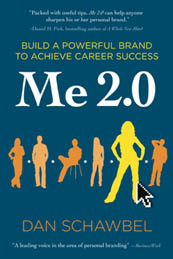A few months ago, personal-branding guru Dan Schawbel sent me a review copy of his book, Me 2.0: Build a Powerful Brand to Achieve Career Success, which came out this spring.
Unfortunately, I haven’t had a chance to review it yet for A Storied Career’s parent site, Quintessential Careers, but I thought about it recently when I read Part 6 (of a planned 10) of an ongoing personal-branding story by Marcos Salazar on Dan’s blog. More about that later.
In Me 2.0, where Dan tells the saga of landing his first post-college job, he writes, “As I went to a series of interviews, I noticed that hiring managers paid attention to three items: the personal story that I told, my CD portfolio [a tool he had prepared to distinguish himself from other candidates], and my enthusiasm. My storyline gave the hiring managers an understanding of my personal identity and career strategy as well as my perseverance, which clearly reflected my desire for the position .”
.”
As far as I can tell, that’s Dan’s last mention of his story (and, again, I have not yet read the book), but his disciple, Salazar, says a lot more. His Part 6 blog entry is entitled My Personal Branding Story Part 6: Narrative, Context, and Being a Purple Cow.
Salazar talks about using stories in networking situations. After giving a couple of compelling examples of stories he told while networking, Salazar writes:
… our brains are wired to think in terms of narratives. Storytelling is one of the few universal human traits that spans across cultures and all of known history. They captivate the mind and elicit emotions that become tied to themes, events, or characters. When this happens, our story gets implanted into memory easier and much more permanently. This is why creating a narrative about your personal brand is infinitely better than simply stating your job title.
In Part 7, Salazar talks about carrying through one’s story to online venues, such as blogging:
Whether we realize it or not, we are all creating a narrative about ourselves online. Everything we post, comment on, or upload is contributing to the story of who we are online — potentially to millions. And even if you don’t make a conscious effort to create an online presence, that too is a narrative because you are leaving your personal brand to chance.
Salazar then presents a story-based test for maintaining one’s personal brand:
… one thing to always keep in mind is that anything you post could have an impact on the narrative you are trying to create. So when forming a strategy, ask yourself, “How is this going to contribute to the story I want to tell?” Finding answers to this question will provide you with a good guide in developing a strong personal brand both on and offline.
I would love to know more about how Dan Schawbel developed and told his story (and indeed what the story was) and how employers engaged with it — because I am convinced this employer desire to hear the candidate’s narrative is a huge untold story in the hiring process.
I am heartened by the way Salazar uses his story as a test how strong his personal brand is.
